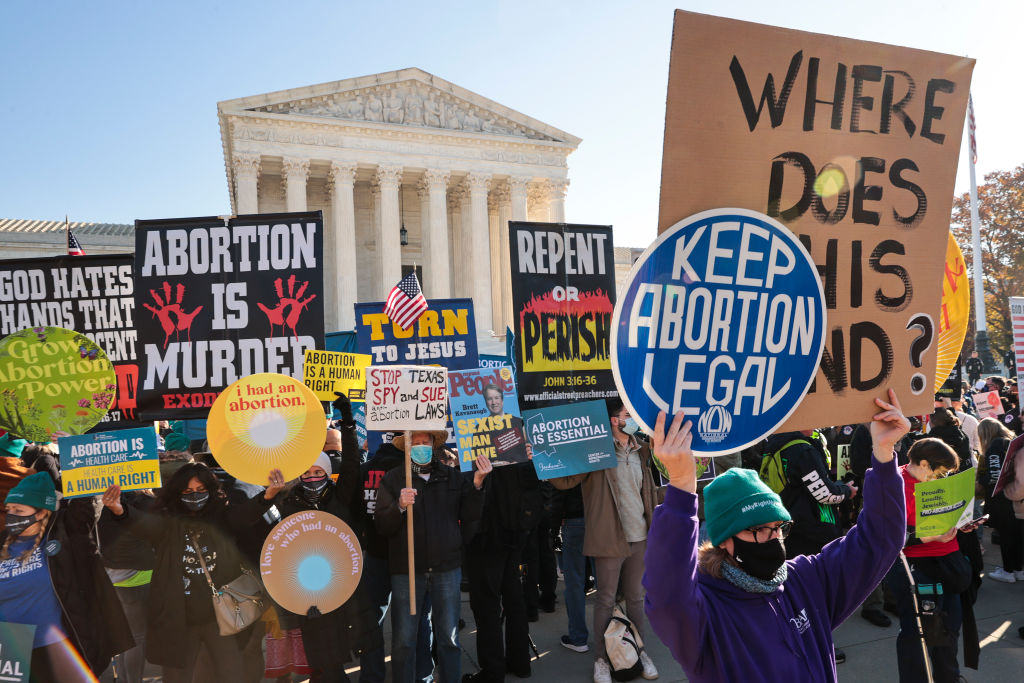Is abortion a losing issue for Republicans?
It will be for some Republicans, surely. Nobody expects a Republican to be elected to Congress from the Bay Area on an anti-abortion platform, in part because nobody expects a Republican to be elected to Congress from the Bay Area at all. But since the Dobbs decision, the cause of abortion rights—the most ghastly and bloodthirsty enthusiasm that can be celebrated in polite society—has won victories from Kansas to Kentucky.
There is one thing that those who long opposed Roe v. Wade and those who support abortion rights should be able to agree on: Dobbs is working exactly as it is supposed to work.
Or at least they should be able to agree, if the debate were an intellectually honest one on both sides, which it isn’t.
This is what returning an issue to the states, their legislators, and the democratically accountable lawmaking process looks like: a big political fight in which both sides win some and lose some. Roe was a blight on U.S. democracy, an imposition by a Supreme Court whose judges were acting as an unelected and unaccountable national super-legislature, usurping from the lawmakers the power to make law and from the people the power to address urgent public questions through elections. There are certain questions that our constitutional order does put beyond the reach of democracy—and thank goodness for it! But the people had a say in the Constitution and the Bill of Rights—and that say is what confers democratic legitimacy on the undemocratic and indeed anti-democratic aspects of our government.
Judicial activism of the kind typified by Roe is democratically and constitutionally illegitimate because it represents the theft of power from the people by judges who have no right to that power. It is, in effect, a single-issue coup d’état. That is why there were always a few intellectually honest legal critics who opposed Roe despite supporting abortion rights as a moral, legal, and political issue. I think the United States should have a different kind of tax system than the one it has, but I would not empower the “nine-headed Caesar” of which Antonin Scalia wrote to achieve that end. For that matter, I would not empower the Supreme Court to simply arrogate unto itself the power to prohibit abortion throughout the United States.
All Dobbs did was what opponents of Roe had sought: It returned abortion to its rightful place as a political issue to be addressed in a situation that is political and by means that are legitimate and democratic. It is natural—and good—that this will require ordinary political work. Dobbs gave the pro-life movement a chance to win politically, but it also gave the pro-life movement a chance to lose. Abortion opponents are not always good at politics—these are, after all, mostly Republicans we’re talking about. (My friend Alexandra DeSanctis of the Ethics and Public Policy Center has a good column about the question in National Review.) A chance to succeed or to lose in politics is the only thing reasonable Roe opponents ever expected from the Supreme Court.
No sensible person ever thought that after Roe was vacated abortion opponents were simply going to march triumphantly from sea to shining sea vanquishing all who oppose them. It took half a century to get rid of Roe, and it is likely to take another half a century to come to a national modus vivendi, if that contextually optimistic expression can be permitted here, when it comes to abortion. I hope that this settlement looks more like Texas’ arrangements than California’s, but, in reality, I do not expect that Texas’ very strict abortion regime will endure without some degree of effective opposition, and Texas may very well end up adopting a more permissive abortion rule when it comes to early pregnancy. There already is talk of that, including among some anti-abortion Republicans.
This political fight is what the pro-life movement has been demanding for 50 years. It is not going to be a war without some lost battles, and it is not going to be easy or pleasant. It is going to be hard and sometimes terrible, with the lone redeeming quality of being better than every alternative.








Please note that we at The Dispatch hold ourselves, our work, and our commenters to a higher standard than other places on the internet. We welcome comments that foster genuine debate or discussion—including comments critical of us or our work—but responses that include ad hominem attacks on fellow Dispatch members or are intended to stoke fear and anger may be moderated.
With your membership, you only have the ability to comment on The Morning Dispatch articles. Consider upgrading to join the conversation everywhere.